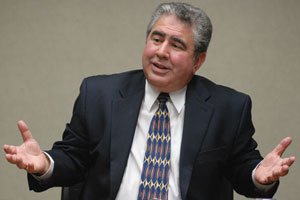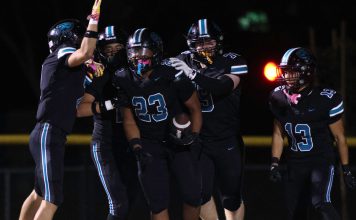One local conservative activist has mounted a recall campaign
against Mayor Al Pinheiro at the same time a unanimous police union
approved a no-confidence vote against the mayor, both camps
claiming the long-time city figure ignores public safety needs.
One local conservative activist has mounted a recall campaign against Mayor Al Pinheiro at the same time a unanimous police union approved a no-confidence vote against the mayor, both camps claiming the long-time city figure ignores public safety needs.
There has never been a successful recall in Gilroy, according to the city clerk, but the need for one became especially clear to Mark Zappa two weeks ago when the “Recall Pinheiro” campaign leader witnessed a gang fight in the parking lot outside Starbucks on First Street while sipping coffee with Councilman Perry Woodward.
“It was the middle of the afternoon, and a fight among 10 young men broke out in the parking lot. It was unbelievable,” Woodward said – adding that he had “no official opinion” on the recall matter. “Moments before, (Zappa and I) were out there talking about the gang problem, and then sure enough, a fight broke out.”
It was the day after the council voted 5-2, with Councilmen Craig Gartman and Woodward dissenting, to approve an agreement with the 56-member POA – which has chastised the mayor but not explicitly called for his recall – to save $1.1 million through furloughs and other cuts. The police department was, and still is, coping with the freezing of more than a dozen sworn and non-sworn positions. Chief Denise Turner, who said she had no input in the recall effort, has since bemoaned the re-deployment of officers as her department struggles to maintain adequate street presence. Gilroy has about 1.1 officers per 1,000 residents compared to the national average of 1.5, according to FBI records.
“(Gilroy Police Officers Association) members now feel it is their duty to step in and let the citizens of Gilroy know that the mayor’s actions have created historically low levels of police service and officer morale in Gilroy,” POA President Mitch Madruga wrote. “It is a rarity that a local public safety organization takes such a strong position, and we don’t do this lightly.”
The mayor called the entire situation a “sad day for Gilroy” and labeled criticism from Zappa – who was involved in a successful recall 10 years ago in Morgan Hill – and the POA as personal and political attacks lacking merit. He also pointed to the council’s 10-percent salary reduction, which equals about $8,000 a year, as comparable to concessions made by the city’s non-represented employees and its municipal, managerial, fire and police unions. These salary reductions will help save $3.1 million this fiscal year. Those savings will bring the deficit down to $1.6 million. The city budgets about $37 million in expenditures annually.
Once residents fully understand the magnitude of the city’s finances and the council’s desire to maintain services, Pinheiro said he expected voters – 54 percent of whom elected him in 2007 – to vindicate him in any potential recall. Forcing a ballot measure requires about 3,700 signatures from the 18,500 or so registered voters here, according to the city clerk, who said she has not received any petition from Zappa for review, which her office must do under state election codes before he can start gathering signatures.
“I think the community in general understands we’re trying to do the best we can to provide services with the money we’re receiving,” Pinheiro said. “I have children who have families here. I live here, and we all want the best for this city.”
Pinheiro also rebutted criticism of the city’s $13.2 million purchase of Gilroy Gardens last year and the millions it plans to spend on the downtown Cultural Arts Center as unfounded because those dollars came, and will come, from restricted funds that cannot pay salaries, he said. On the other hand, Zappa – who owns Zapp-A-Form Printing and Promotions, which supplies everything from customized key chains to business forms – sees the city’s pocketbook as a holistic account, arguing, “Public safety is number one on most people’s minds, not circus trees or culture.”
As for the police contract, the mayor wondered why he was being crucified when four other council members also approved it. Zappa explained in a letter to The Dispatch: “Since recalling all members of the council who deserve to be removed from office creates insecurity, surgically removing the Mayor makes the most sense. It will send a strong message to the other starry eyed members of the council who the real boss is.”
Zappa has recently criticized Pinheiro for a quote he gave to the Metro Silicon Valley in an article about gang violence. The reporter quoted Pinheiro as saying, “We have our problems … But let’s not get the media hyped up and point to Gilroy as a hard-core gang kind of place.”
Having witnessed the incident outside Starbucks soon after reading the article, Zappa – a former law enforcement officer and military serviceman who decried the mayor for never going on a ride-along with a Gilroy cop – said the mayor’s response is “a classic example of Al Pinheiro’s single-minded approach to leadership. Deny, deny, deny.”
Also, a recent flier the POA mailed to residents – which Zappa’s company did not print – included a collage of Dispatch headlines from the spring and summer of 2009: “Three stabbed in gang-related incident,” reads one headline. “Man stabs teenage boy, punches younger sister,” reads another. Madruga did not return phone calls for comment on the flier or to say how much the mailer cost.
On the reverse side is a letter penned by Madruga, who wrote a separate letter Sunday to The Dispatch attacking Pinheiro.
“Over the last seven months, the citizens and employees of the City of Gilroy have been placed under siege by the complete lack of leadership from Mayor Al Pinheiro,” Madruga’s letter reads. “The Mayor has jeopardized the public safety of the citizens of Gilroy by repeatedly threatening public safety employees with layoffs. This has caused (two) highly trained, experienced Police Officers to leave the Gilroy Police Department.”
Another issue Zappa has pointed to is the mayor’s opposition to binding arbitration. This is the process by which a third-party arbiter resolves stalled contract negotiations between the city and public safety unions. Pinheiro has lambasted the process as giving an outsider control over the city’s finances, but firefighters – who have invoked the procedure twice since voters approved it in 1988 – and police officers, who have never invoked it, are prohibited from striking by state law and see arbitration as their only real bargaining chip.
“The mayor’s ego and his emotions get into the way of his decisions,” Zappa said. “I’m going to do something about that.”














